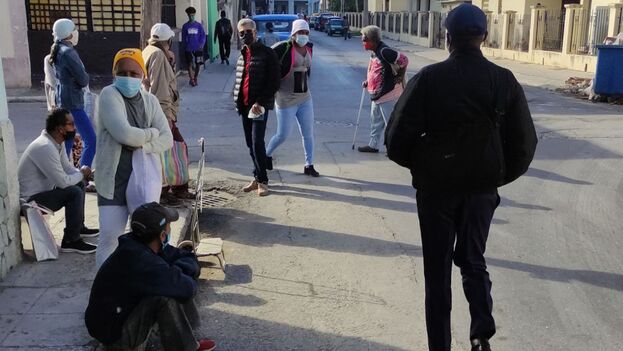
![]() 14ymedio, Madrid, 23 December 2022 — The Electric Union of Cuba is about to achieve a week without announcing an electricity deficit. The blackouts, which were a constant during the second half of 2022, have made a partial truce with the Government, which pledged — after the failed prediction of May — that in December the situation would improve. The data, however, show how the fall in demand — around 12% — is one of the factors that most helped the authorities.
14ymedio, Madrid, 23 December 2022 — The Electric Union of Cuba is about to achieve a week without announcing an electricity deficit. The blackouts, which were a constant during the second half of 2022, have made a partial truce with the Government, which pledged — after the failed prediction of May — that in December the situation would improve. The data, however, show how the fall in demand — around 12% — is one of the factors that most helped the authorities.
The Deputy Prime Minister of Cuba, Ramiro Valdés Menéndez, visited this Thursday in Mayarí (Holguín), the Lidio Ramón Pérez thermoelectric plant, known — by its location — as Felton. The largest plant on the Island, with a capacity of almost 500 MW, has completed the maintenance carried out weeks ago to recover block 1, which was producing just 175 MW of the 260 MW of maximum capacity.
The comandante congratulated himself, together with the director of the plant, Euclides Rodríguez Mejías, for the improvement experienced after the repair of the leaks, which have made it possible to obtain 245 MW per day in the last 15 days.
The gain is, in any case, a small part of the energy recovered on the Island, according to the calculations of the Minister of Energy and Mines, Vicente de la O’Levy. The official said days ago that the import of materials has made it possible to increase the generation capacity of the eight plants and that, in addition, units of the distributed network have been incorporated that provided almost 300 MW more.
According to the analysis of the EFE agency, which has calculated the UNE data, since September 30 and this Thursday, the generation has increased by almost 1,000 MW, a third of the demand. But the fall in demand is part of the relief, since this Thursday it was 2,800 MW compared to 3,170 MW on December 2.
Temperatures, according to the Spanish agency, have been at 93 degrees since November 26, but they have also been below 68 degrees, requiring lower consumption in homes, which spend a lot of energy on air conditioners and fans to relieve heat, according to the Government itself.
In addition, the graphs also show that cuts or disconnections due to deficit forecast (which the authorities call “affects”) have fallen since November. “If on November 29 the affects accounted for 37% of the maximum demand, by December 7 they fell below 10%,” EFE says.
While the weather cools down, the repair on Unit 2 in Felton, which burned down this summer, continues. In yesterday’s visit, Valdés Menéndez learned that 53% of the work has been done, and that currently, work is being done on the disassembly of the boiler and the high-medium pressure cylinder of the turbine, as well as the maintenance and conservation of several elements.
The disassembly phase of the furnace, the main steam pipes, the roof, the middle wall, the convective shaft and other aggregates have already been done, they explained to the comandante, who asked that as many personnel as possible be involved to ensure safety and deadlines.
Felton was designated by Miguel Díaz-Canel himself as key to the recovery of energy. At the end of August, and on a tour with Raúl Castro through the Holguín plant, the president stated that all the country’s resources were at the disposal of the thermoelectric plant. “Felton 1 decides today on the course of the recovery strategy, and its start is vital for the fulfillment of the objectives set, of prime importance, to minimize or eliminate the blackouts next December,” he said.
At the beginning of December, the president toured the countries that can potentially supply the most energy to the Island: Algeria, Turkey, China and Russia. Although the fruits of those meetings are not yet palpable in the area, Díaz-Canel urgently needs this week’s respite not to be a mirage that will fade in the coming months with the rise in temperatures. The protests that shook the Island this summer confirm that he depends on it and so does the survival of the system.
Translated by Regina Anavy
_______________
COLLABORATE WITH OUR WORK: The 14ymedio team is committed to practicing serious journalism that reflects Cuba’s reality in all its depth. Thank you for joining us on this long journey. We invite you to continue supporting us by becoming a member of 14ymedio now. Together we can continue transforming journalism in Cuba.
